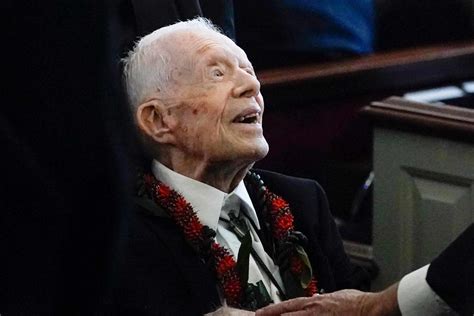The distinction of being the longest living president in U.S. history is a unique one, reflecting a combination of genetic longevity, advances in medical care, and a bit of luck. As of my last update, this title is held by Jimmy Carter, who has lived a life marked by significant political, humanitarian, and personal achievements. Carter’s journey to this distinction is filled with intriguing moments, decisions, and experiences that have contributed to his long and fulfilling life.
Early Life and Career
Jimmy Carter was born on October 1, 1924, in Plains, Georgia, to James Earl Carter Sr. and Bessie Lillian Gordy Carter. His early life was shaped by a strong work ethic, courtesy of his father’s farming business, and a Christian upbringing that would later influence his political and humanitarian endeavors. Carter’s educational pursuits led him to the United States Naval Academy, where he graduated in 1946. He then served in the Navy’s submarine fleet, advancing to the rank of lieutenant before his honorable discharge in 1953.
Entrance into Politics
Carter’s foray into politics began with his election to the Georgia State Senate in 1962, a position he held until 1967. He then served as the Governor of Georgia from 1971 to 1975. His political career was marked by a commitment to social justice and human rights, principles that would become central themes during his presidency. Carter’s decision to run for president in 1976 was somewhat unexpected, but his campaign, which focused on integrity, morality, and a return to more honest governance after the Watergate scandal, resonated with many Americans.
Presidency and Post-Presidency
Jimmy Carter was inaugurated as the 39th President of the United States on January 20, 1977. His presidency was characterized by significant events, including the Camp David Accords, which brought peace between Israel and Egypt, and the Carter Doctrine, which asserted U.S. interests in the Persian Gulf. Despite these achievements, his presidency was also marked by challenges such as high inflation and the Iran hostage crisis, which ultimately contributed to his loss in the 1980 presidential election.
Post-presidency, Carter has dedicated his life to numerous humanitarian efforts through the Carter Center, which he founded with his wife, Rosalynn, in 1982. The center’s work in democracy, human rights, and global health has been recognized worldwide, earning Carter the Nobel Peace Prize in 2002. His commitment to helping others, whether through election monitoring, disease eradication, or housing construction with Habitat for Humanity, has been unwavering.
Factors Contributing to Longevity
Several factors have likely contributed to Jimmy Carter’s longevity. His lifestyle, which includes a diet rich in nuts (especially peanuts, given his farming background), regular exercise, and a strong spiritual belief system, aligns with many principles known to promote health and well-being. Additionally, advances in medical care have undoubtedly played a role, allowing for the management and treatment of various health issues that might have been more challenging in earlier times.
Challenges and Triumphs
Like many individuals who have lived into their nineties, Carter has faced health challenges, including a diagnosis of melanoma in 2015. However, his resilience and the effectiveness of modern healthcare have allowed him to manage these challenges and continue his active life.
Legacy and Impact
Jimmy Carter’s legacy is complex and multifaceted. While his presidency was marked by significant challenges, his post-presidential life has been a testament to the impact one person can have on global issues. His commitment to peace, justice, and human rights has inspired countless individuals around the world. As the longest living president, Carter stands as a living historical figure, offering insights into the past while continuing to shape the present through his actions and advocacy.
Conclusion
Jimmy Carter’s life, marked by its length, achievements, and challenges, serves as a powerful example of dedication, perseverance, and the pursuit of integrity. As we reflect on his journey, we are reminded of the importance of living a life of purpose and service to others. Carter’s story, still unfolding, continues to inspire and educate, offering valuable lessons for future generations.
What is Jimmy Carter's most notable achievement as president?
+One of Jimmy Carter's most notable achievements as president was brokering the Camp David Accords, a peace treaty between Israel and Egypt signed in 1978. This historic agreement not only marked a significant shift in the geopolitical landscape of the Middle East but also demonstrated Carter's commitment to peace and his ability to facilitate difficult negotiations.
How has Jimmy Carter contributed to global health through the Carter Center?
+The Carter Center, founded by Jimmy and Rosalynn Carter, has been instrumental in global health initiatives, particularly in the eradication and control of diseases such as Guinea worm disease, river blindness, and malaria. Through its programs, the center has worked to improve access to healthcare, strengthen health systems, and promote human rights, significantly impacting the lives of millions of people worldwide.
What does Jimmy Carter's Nobel Peace Prize recognize?
+Jimmy Carter was awarded the Nobel Peace Prize in 2002 for his decades of untiring effort to find peaceful solutions to international conflicts, to advance democracy and human rights, and to promote economic and social development. This recognition honors not only his work during his presidency but also his tireless efforts through the Carter Center to improve the lives of people around the world.
In reflecting on Jimmy Carter’s life and achievements, it becomes clear that his distinction as the longest living president is not merely a matter of longevity but a testament to a life dedicated to service, peace, and the pursuit of a more just and equitable world for all.



